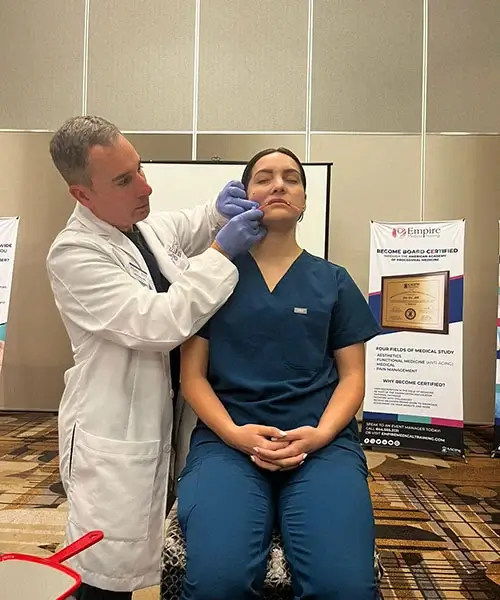Setting the Record Straight: Who Can Administer Lip Injections?
By Dr. Stephen Cosentino
PRESIDENT OF EMPIRE MEDICAL TRAINING
Whether you’re a patient seeking the best possible cosmetic care or a provider looking to expand your practice, you deserve straight answers about who can administer lip injections.
The answer isn’t quite as simple as it might seem. Each state medical board is ultimately responsible for setting practice standards and certification requirements for cosmetic procedures like lip injections, and accurate information about what’s required and who’s eligible can be difficult to find.
But if you’re looking for general information about who can perform cosmetic injections, you’ve come to the right place.
Who Can Do Lip Injections?
Lip injection training and certification requirements depend on the type of lip injection we’re talking about.
Botulinum Toxin Injections
Generally, the following types of providers can administer Botox® and other botulinum toxin injectables:
- Registered nurses
- Nurse practitioners
- Physician assistants
- Medical doctors (nonsurgical), including specialists like dermatologists
- Plastic surgeons
- Dentists and oral surgeons
Training and certification requirements vary by state. Active board certification (medical licensure) and successful completion of accredited training coursework (which should include didactic and hands-on training) are mandatory.
Each discipline has its own certification board. For example, nurse practitioners receive their credentials from the Academy of Nurse Practitioners Certification Board. Obtaining the proper practitioner certification is the most time-consuming part; some disciplines require multiple years of experience.
Additionally, each state medical board has its own course accreditation and hours-logged requirements. Continuing education may be required as well.
Dermal Filler Injections
Dermal filler certification requirements are similar to botulinum toxin certification requirements. In general, the same types of providers are eligible. Providers must complete accredited dermal filler training coursework (which may be combined with botulinum toxin instruction) and any continuing education requirements.
Other Types of Lip Injections
As the aesthetic industry matures, injectables specialists no longer perform only Botox and/or dermal filler injections. Direct collagen injections and PRP (platelet rich plasma) injections are increasingly common. These injection techniques tend not to be as heavily regulated, but proper board certification is likely required regardless.
Lip Injection Risks
While Botox and dermal filler procedures are generally well-tolerated, they do carry some risks, which is why it’s so important for patients to work with providers certified to administer these injectables.
Botox Risks
Botulinum toxin injection risks include mild and temporary side effects like:
- Minor swelling at the injection site
- Itchiness or slight pain at the injection site
- Minor bruising or swelling
- Fatigue
- Throat irritation
- Headache
- Vague flulike symptoms
More rarely, potentially serious side effects can occur:
- Facial paralysis and asymmetry
- Incontinence
- Allergic reaction
- Infection
These side effects may require prompt medical attention.
Dermal Filler Risks
Dermal filler risks are most often injection sequelae such as:
- Bruising or swelling (minor)
- Lumps under the skin
- Itching or redness at the injection site
The most serious dermal filler risk is blood clotting caused by injection into a blood vessel. In rare cases, this can lead to skin necrosis or cardiovascular events such as stroke. These complications require immediate medical treatment.


